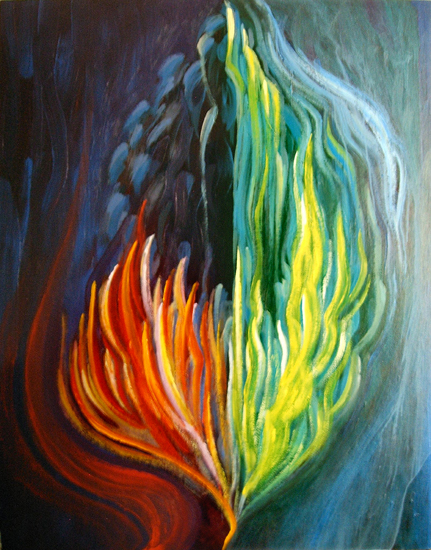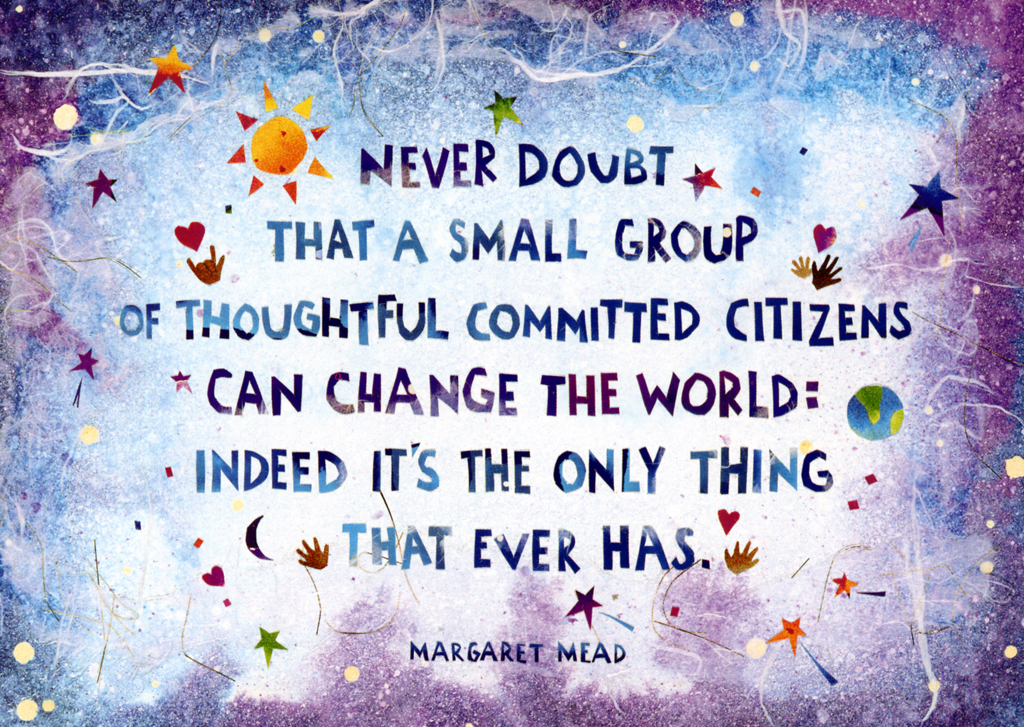Mark 8:27-38
Welcome, my friends, to “Take Up Your Cross Sunday.”
Aren’t you excited? Isn’t this exactly what you had planned on doing when you got in your cars and came to church this morning?
This is the day when you have to decide: Are you going to take up your cross and follow Jesus?
Now, normally, I can tell you that on a Sunday like today, this is not the focus of the sermons. Look at the front of your bulletin covers. Go ahead, look, look, look. It’s very pretty and should not be wasted. What does it say on the front of your bulletin cover but, “Who do you say that I am?” And so most of the time, when we hit this portion of the Gospel, Proper 19, what we decide to do is have a little chat with each of us about “who do you say that I am?” So that we can each name Jesus.
If we’re not focusing on that, then we like to focus on poor Peter. Peter, who is so quick to say, “You’re the Messiah! I know it!” – remember, this is the turning point of Mark’s Gospel. This is when it becomes open and public knowledge about who Jesus is and what he’s going to do – So we focus on Peter saying, “You’re the Messiah!” and Jesus saying, “Yes, and this is what it means to be the Messiah. I am going to be rejected. And I am going to be killed. And on the third day, I will be raised again.”
What does Peter do? He begins to rebuke Jesus – “No, Lord, you can’t go and do that!” And what does Jesus do, but he turns around and he rebukes Peter and says, “Get behind me, Satan!”
We love to revel in that, don’t we? Don’t we love to revel in the times when Jesus says – to someone else, never to us – but to somebody else, “Get behind me, Satan!” Because then we don’t have to deal with the issue ourselves.
But the fact of the matter is, today is “Take Up Your Cross Sunday.” Today is the day when you have to decide: Are you willing to do that? Are you willing to follow Jesus? Not just a little bit. But all the way?
Now, most of the time, when people think about taking up their crosses and following Jesus, they think about difficult that is, how hard it is. And that’s what gets in the way of taking up that cross – really taking it up – because, you know, spit, I don’t want to do something that hard.
Does taking up your cross and following Jesus mean that you have to become a missionary and move to Sudan and live in a mud hut with no clean water, no running water, no electricity, and death and disease staring you in the face every moment of every day?
Does it mean that you get to stay in this country but you have to give up everything you own? Your homes – for which you worked so hard? Your jobs – that gave you the money to buy those homes? Your nice cars? Your nice clothes? Does it mean that you have to give up your retirement? Does it mean that you have to give up your kids’ college fund?
Because if that’s what it means to take up your cross, Lord, I’m not certain I’m going to go there with you. I’m not certain that that’s the kind of Christian I’m called to be. That must be the guy down the street. The one at whom you’re always yelling, “Get behind me, Satan!” That’s his problem, not mine.
It’s a hard thing to take up your cross and follow Jesus, especially when you read it in the New Revised Standard Version, which is the version of the Gospel we just read.
But I want to read it to you in a different translation, so see if it has any impact, if it makes any difference in your lives.
Jesus said, “Anyone who intends to come with me has to let me lead.
You are not in the driver’s seat; I am. Do not run from suffering; embrace it. Follow me, and I’ll show you how. Self-help is no help at all. Self-sacrifice is the way, my way, to saving yourself, your true self. What good would it do to get everything you want and lose you, the real you? What could you ever trade your soul for?”[1]
This translation, my friends, is not actually a translation; it is a paraphrase of the Gospel. It was written by a theologian by the name of Eugene Peterson. He wrote this paraphrase – actually, the entire Bible; he’s now finished it – so that people who had never read the Bible, because it didn’t seem to matter to them, didn’t speak to them, and so that people who have read the Bible so much that everything in it is just old hat, been-there-done-that-got-the-T-shirt-while-I-was-at-it – so that both groups could hear the Gospel in a new way.[2] Both groups would be able to experience God in a new way. And both groups would be able to respond in a new way.
So instead of me asking you to take up your cross today, how about I simply ask you to do a little bit of self-sacrifice?
How about I ask you to let Jesus be the driver in your life?
Isn’t that just a little more palatable?
Isn’t that something that you are probably a little more willing to do?
Anybody?
Guess what?
It’s just as hard.
Because what Jesus is asking us to do is to put Jesus at the center of our lives – in everything we do.
You’ve heard the expression, “The devil is in the details”?
You know that one?
It’s wrong.
Discipleshipis in the details.
Discipleship is in the details.
Everything you do in your life, every minute action, thought, decision, the details of our life – that’s where you need to be a disciple most.
Some easy examples:
When you go to your local coffee shop – I don’t think there’s a Starbucks in town, is there? – so you go into your local coffee shop, if every single time you go in there, you get a disposable cup for your coffee, you need to stop and think again. Because by doing that, that little detail, you are telling God you do not care about God’s very good creation. Would it kill you to have your own go-cup that you brought with you?
If, when you’re driving through Aldie (a small town nearby) at … twenty … five … miles … per … hour … and not one tick above that, especially if “You’re not from around here, are you?” … you know when you come out of Aldie, and you get to speed up all the way to 40, if there’s somebody who is on your tail, just waiting for the lines in the road to change so that they can jump around you, would it kill you to let that person go around you? Because maybe they do have an emergency. Maybe there is some urgency in their life, of which you know nothing.
When you are in the grocery store, and the woman who is checking you out is obviously having a terrible day; her eyes are filled with tears. Discipleship means stopping and talking with the woman. It means holding up the entire rest of the line so that you can give pastoral care to somebody who actually needs it, so that you can give grace upon grace to someone who has not experienced grace.
When you are in that same line, and you have the little old lady who is taking forever to find her checkbook – never mind writing the bloody check – and you’re getting tense because you want to say, “Hurry it up!” … stop and think for a moment … that for this woman, this may be the most human contact that she has throughout the day, and by God, she’s not going to hurry it up.
When we stop and we think, in the details of our lives, about what Jesus would have us to do, that’s when we are the truest disciples of our Lord and Savior Jesus Christ.
When we give grace to other people …
When we realize that just because you and I don’t agree on something doesn’t mean that we have to be enemies …
When we model a behavior of acceptance …
When we stop talking about them, as opposed to us – because there are no “us’s” and “them’s” in God’s very good creation …
Those little details … which I know do not sound like much, but I can guarantee you – if in the tiniest details of your life, you are stopping to be faithful, you are doing your best to be a disciple of Jesus, to do what Jesus did, which was to feed the hungry and give water to the thirsty, to give sight to the blind, and to make the mute speak, and the deaf hear, to make the lame leap for joy …
When you do what Jesus did, which was to welcome the unwelcome, to include the excluded, to love the unloved, to give hope to people whom have known no hope from generation to generation …
When you live your life that way, then you are truly a disciple of Jesus.
That’s what it means to take up your cross, so that in every moment of your life, you think about the impact you are having on God’s creation, the impact you are having on God’s people.
It’s the self-sacrifice of realizing that you … me … you … and you … we are not the center of the world. The world does not revolve around us.
When we take that moment to step back and to say, “What is it that Jesus would have me to do?” – whether I want to do it or not, that’s not the question – the question is, “What does Jesus want us to do?” – when we do that, then – then – we are truly being disciples of our Lord and Savior Jesus Christ.
Then we are taking up our cross.
Then we are following Jesus.
You can’t simply believe that you follow Jesus by proclaiming, God the Father, God the Son, and God the Holy Spirit! It’s not enough! Jesus has expectations that we are going to try and live Jesus’ way in this world.
So that we can indeed realize God’s dream for all of creation.
In this day and age, in this country, when we are so set on dividing each other, when we are so set on attacking each other, when we are not bothering to listen to each other, when we refuse to give grace to each, imagine the impact that we could have, if in the details of our lives, we were disciples of Jesus.
 If we stretched out our hand to someone who is different from us, who thinks differently, God forbid who votes differently, and said, “You are a beloved child of God.”
If we stretched out our hand to someone who is different from us, who thinks differently, God forbid who votes differently, and said, “You are a beloved child of God.”
(Don’t be shaking our head! Don’t be shaking your head!)
Just because we don’t agree politically doesn’t mean that we are not beloved children of God, you and I both!
What kind of model could we set?
How would it change the world … if we focused on Jesus and what Jesus wants, and not on ourselves and what we want?
As I said, welcome to “Take Up Your Cross Sunday.”
Do I have any takers?
Amen.
Sermon preached on the 16th Sunday after Pentecost, Proper 19, Year B, at Emmanuel Episcopal Church, Middleburg, Va., 16 September 2012.
[1] The Message (Bible), article on Wikipedia, http://en.wikipedia.org/wiki/The_Message_(Bible)
[2] Ibid.










